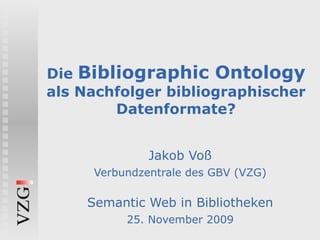Die Bibliographic Ontology als Nachfolger bibliographischer Datenformate?
•Als ODP, PDF herunterladen•
9 gefällt mir•1,309 views
Vortrag zur Bibliographic Ontology (Bibo) auf der Tagung "Semantic Web in Bibliotheken" (#swib09)
Melden
Teilen
Melden
Teilen

Empfohlen
WiSe 2013 | IT-Zertifikat: AMM - Semantic Web II: RDF und FOAF

WiSe 2013 | IT-Zertifikat: AMM - Semantic Web II: RDF und FOAFInstitute for Digital Humanities, University of Cologne
Empfohlen
WiSe 2013 | IT-Zertifikat: AMM - Semantic Web II: RDF und FOAF

WiSe 2013 | IT-Zertifikat: AMM - Semantic Web II: RDF und FOAFInstitute for Digital Humanities, University of Cologne
Mobile Produktentwicklung – wie geht das? Konzeption, Design, Entwicklung, Ve...

Mobile Produktentwicklung – wie geht das? Konzeption, Design, Entwicklung, Ve...Bokowsky + Laymann GmbH
Weitere ähnliche Inhalte
Andere mochten auch
Mobile Produktentwicklung – wie geht das? Konzeption, Design, Entwicklung, Ve...

Mobile Produktentwicklung – wie geht das? Konzeption, Design, Entwicklung, Ve...Bokowsky + Laymann GmbH
Andere mochten auch (20)
"Mehrwert Contact Center" von Necla Haskioglu-Larsch und Dirk Harder, Enghouse

"Mehrwert Contact Center" von Necla Haskioglu-Larsch und Dirk Harder, Enghouse
Herausforderungen und Lösungen bei der Publikation und Nutzung von Normdaten ...

Herausforderungen und Lösungen bei der Publikation und Nutzung von Normdaten ...
Kommunikation und Zusammenarbeit in verteilten Projektteams

Kommunikation und Zusammenarbeit in verteilten Projektteams
Mobile Produktentwicklung – wie geht das? Konzeption, Design, Entwicklung, Ve...

Mobile Produktentwicklung – wie geht das? Konzeption, Design, Entwicklung, Ve...
Vom „Museum der Wünsche“ zum „Netz der Dinge“. Digitales Kuratieren für das M...

Vom „Museum der Wünsche“ zum „Netz der Dinge“. Digitales Kuratieren für das M...
Sampurna Arogyasathi Namasmarn M A R A T H I B E S T S E L L E R Dr

Sampurna Arogyasathi Namasmarn M A R A T H I B E S T S E L L E R Dr
VBH Wissensdatenbank. Präsentation zum Confluence Community Day 2009

VBH Wissensdatenbank. Präsentation zum Confluence Community Day 2009
Ähnlich wie Die Bibliographic Ontology als Nachfolger bibliographischer Datenformate?
Von A wie Artikel recherchieren bis U wie Upload im Repository: Umsetzung von...

Von A wie Artikel recherchieren bis U wie Upload im Repository: Umsetzung von...Universitätsbibliothek der Technischen Universität Berlin
Bit sosem 2016-wieners-sitzung-08_semantic-web

Bit sosem 2016-wieners-sitzung-08_semantic-webInstitute for Digital Humanities, University of Cologne
Ähnlich wie Die Bibliographic Ontology als Nachfolger bibliographischer Datenformate? (20)
AMSL Kick-off-Meeting sächsischer Hochschulbibliotheken

AMSL Kick-off-Meeting sächsischer Hochschulbibliotheken
Kickoff Workshop zum Projekt amsl mit den sächsischen Hochschulbibliotheken

Kickoff Workshop zum Projekt amsl mit den sächsischen Hochschulbibliotheken
Von A wie Artikel recherchieren bis U wie Upload im Repository: Umsetzung von...

Von A wie Artikel recherchieren bis U wie Upload im Repository: Umsetzung von...
Bibliographieren 2.0 - Workshop für BibliothekarInnen an der FU Berlin

Bibliographieren 2.0 - Workshop für BibliothekarInnen an der FU Berlin
Linked Data: Die Zukunft der Nutzung von Katalogdaten

Linked Data: Die Zukunft der Nutzung von Katalogdaten
16. DINI-Jahrestagung: Linked Data und Repositorien

16. DINI-Jahrestagung: Linked Data und Repositorien
Anforderungen an die Wissensrepräsentation im Social Semantic Web

Anforderungen an die Wissensrepräsentation im Social Semantic Web
Einbindung von Linked Data in existierende Bibliotheksanswendungen

Einbindung von Linked Data in existierende Bibliotheksanswendungen
Der Bibliothekskatalog 3.0 oder: Bibliografische Daten als Linked Open Data

Der Bibliothekskatalog 3.0 oder: Bibliografische Daten als Linked Open Data
Mehr von Jakob .
Mehr von Jakob . (20)
Connections that work: Linked Open Data demystified

Connections that work: Linked Open Data demystified
Stand und Planungen im Bereich der Schnittstellen in der VZG

Stand und Planungen im Bereich der Schnittstellen in der VZG
Verwaltung dokumentenorientierter DTDs für den Dokument- und Publikationsserv...

Verwaltung dokumentenorientierter DTDs für den Dokument- und Publikationsserv...
Beschreibung von Bibliotheks-Dienstleistungen mit Mikro-Ontologien

Beschreibung von Bibliotheks-Dienstleistungen mit Mikro-Ontologien
Linking Folksonomies to Knowledge Organization Systems

Linking Folksonomies to Knowledge Organization Systems
Was gibt's wie und wo? Informationen zu Standorten, Exemplaren und Dienstleis...

Was gibt's wie und wo? Informationen zu Standorten, Exemplaren und Dienstleis...
FRBR light with Simplified Ontology for Bibliographic Resource

FRBR light with Simplified Ontology for Bibliographic Resource
Revealing digital documents - concealed structures in data

Revealing digital documents - concealed structures in data
Wie kommen unsere Sacherschließungsdaten ins Semantic Web? Vom lokalen Normda...

Wie kommen unsere Sacherschließungsdaten ins Semantic Web? Vom lokalen Normda...
Quick introduction to the Citation Style Language (CSL)

Quick introduction to the Citation Style Language (CSL)
Die Bibliographic Ontology als Nachfolger bibliographischer Datenformate?
- 1. Die Bibliographic Ontology als Nachfolger bibliographischer Datenformate? Jakob Voß Verbundzentrale des GBV (VZG) Semantic Web in Bibliotheken 25. November 2009
- 12. Event Ontology http://motools.sourceforge.net/event/event.html FOAF http://xmlns.com/ foaf/spec/ WGS84 Geo Positioning Ontology http://www.w3.org/2003/01/geo/ OWL-Time Ontology http://www.w3.org/TR/owl-time Event sub_event agent place time produced_in product